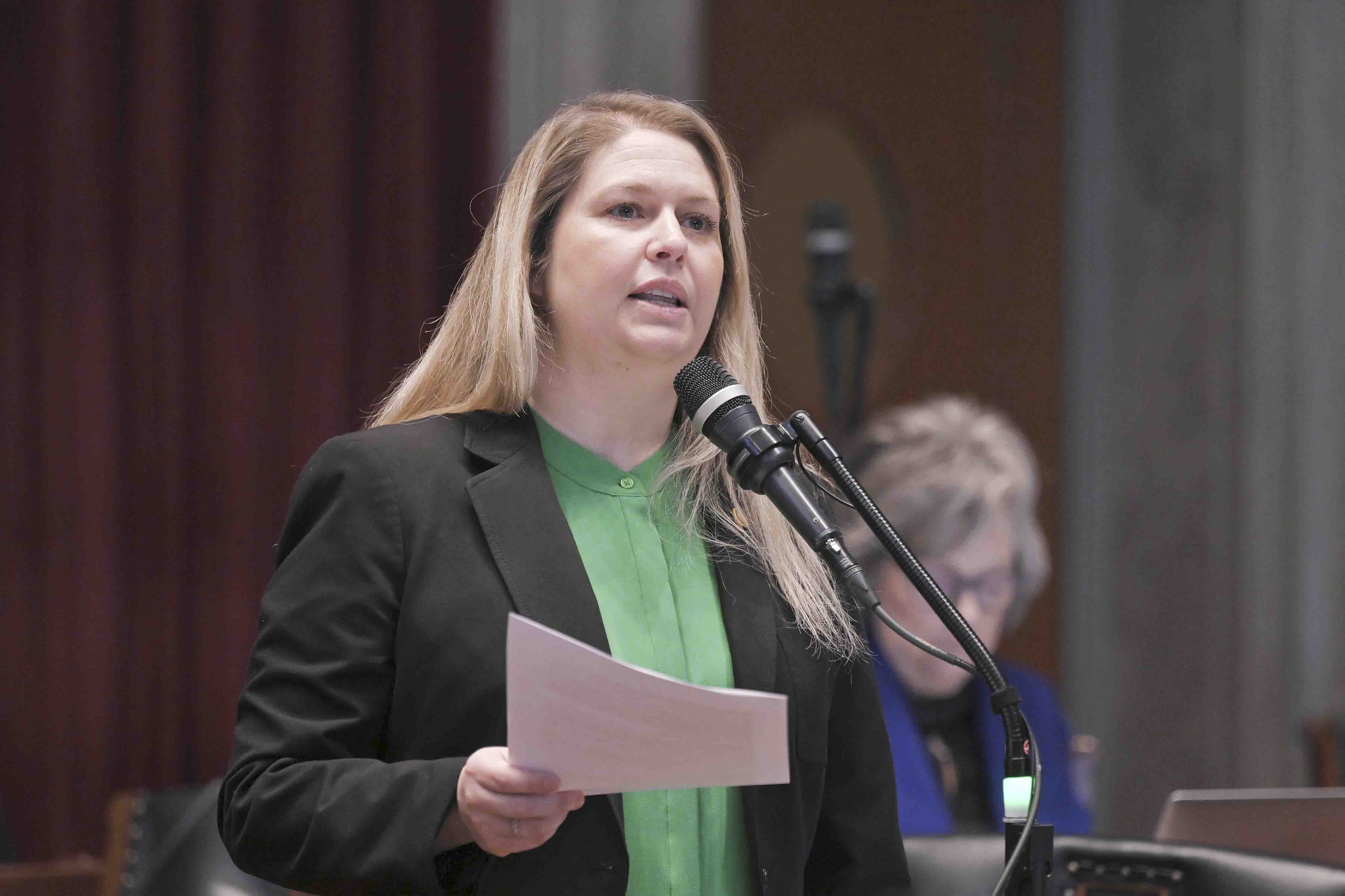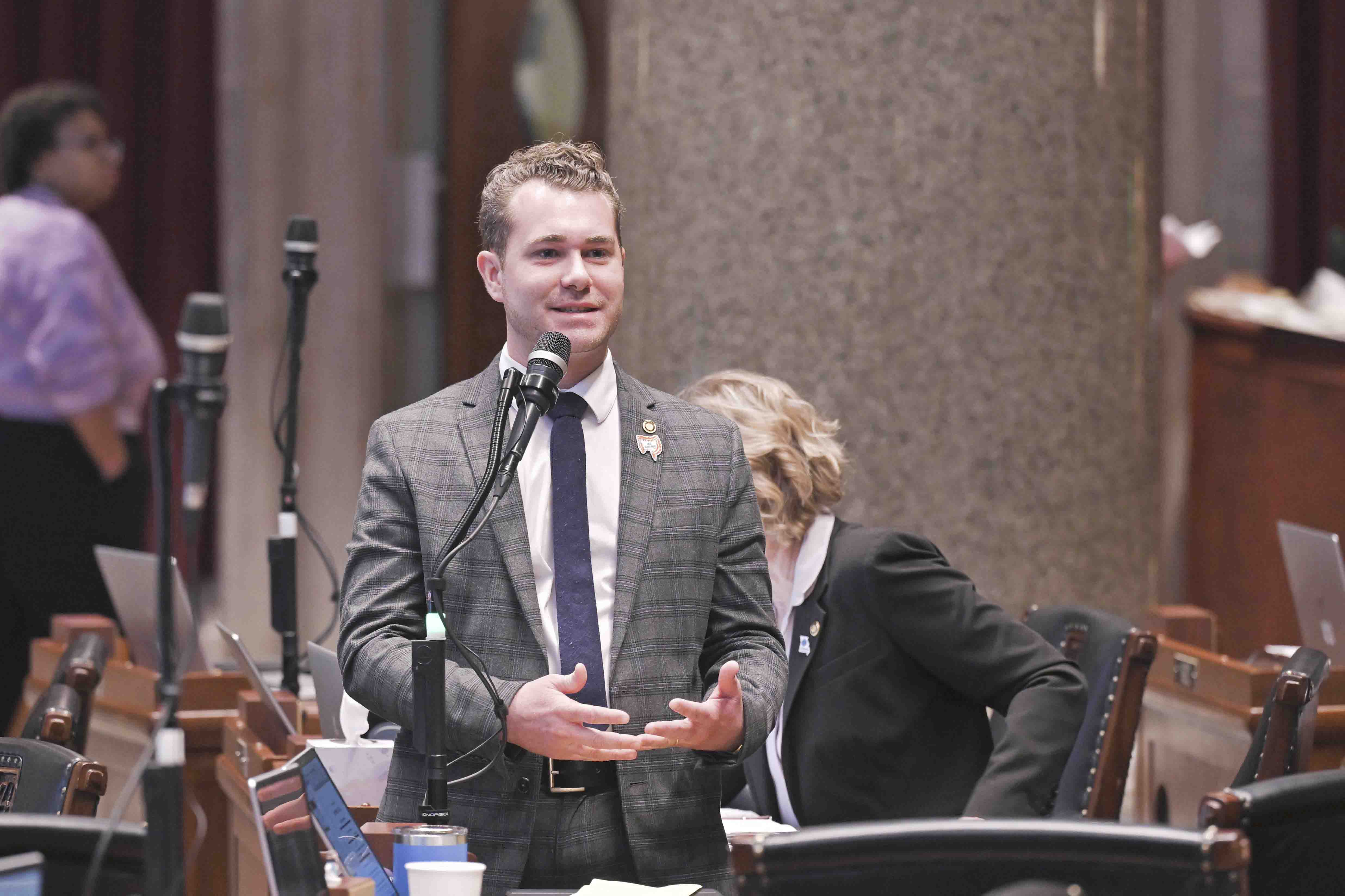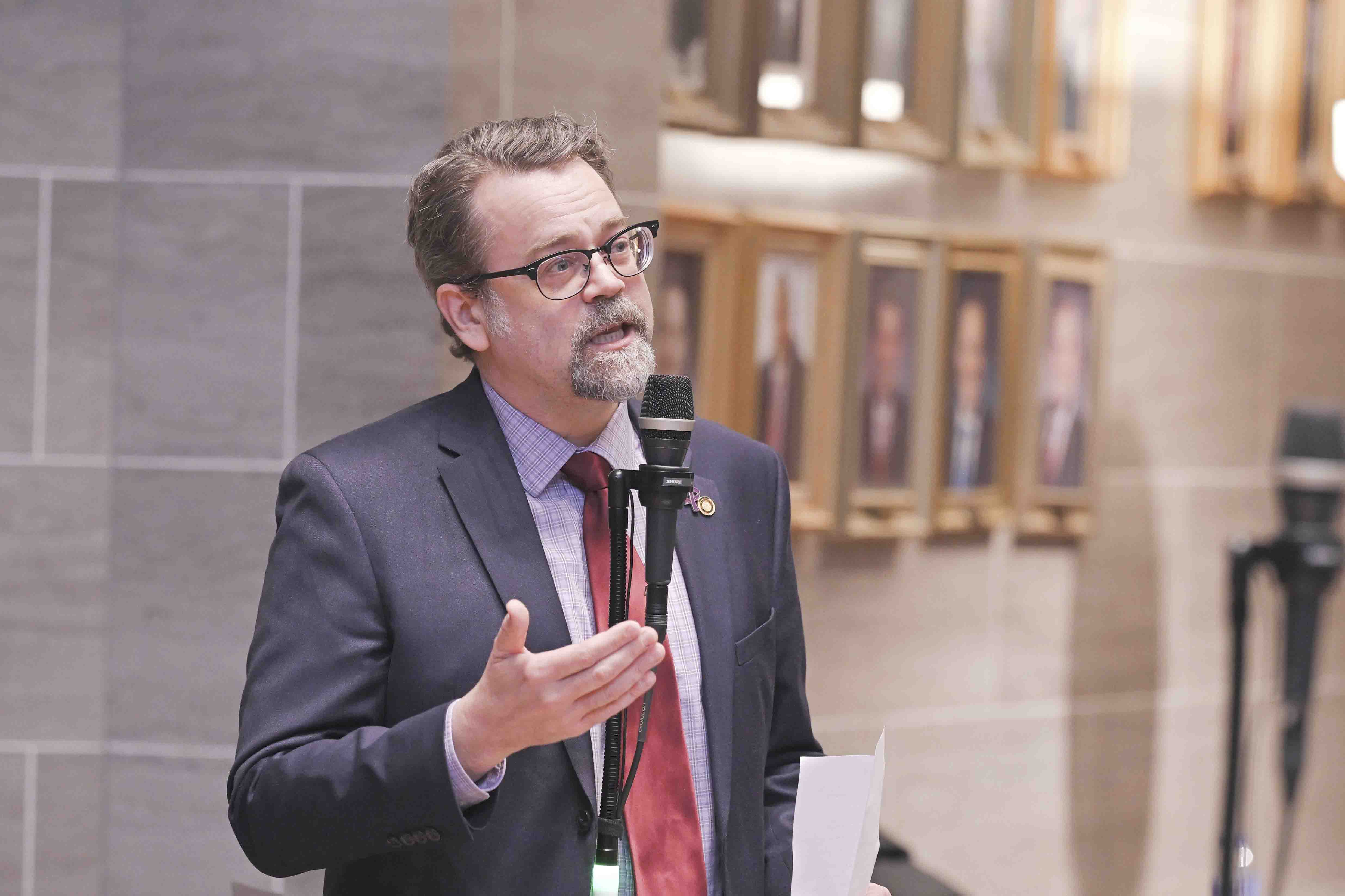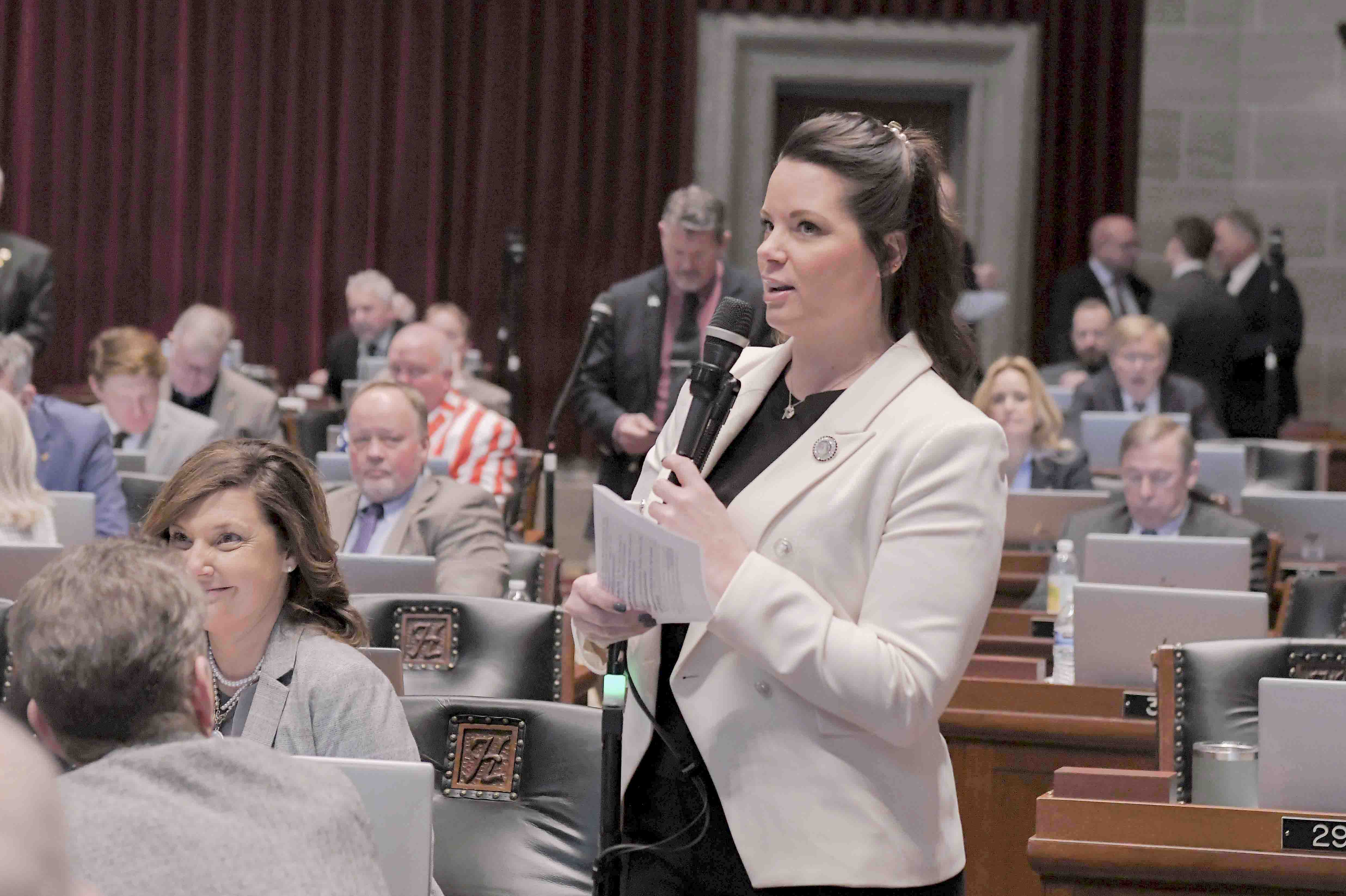Missouri House Democrats discussed what happened this week and looked ahead in the House.
Author: Mike Lear
VIDEO: House Republican media conference 04-10-2025
Majority Floor Leader Alex Riley (R-Springfield) discussed the week that just wrapped up and looked ahead to next week in the House.
VIDEO: House Republicans weekly media conference 04-03-2025
Missouri House Republicans spoke about advancing the proposed state budget for fiscal year 2026 to the Senate.
VIDEO: House Democrats weekly media conference 04-03-2025
Missouri House Democrats addressed reporters and fielded questions after this week’s work in the House, which included sending the Fiscal Year 2026 budget proposal to the Senate.
VIDEO: Missouri House Veterans Recognition Day 03-27-2025
The Missouri House’s annual Veterans Recognition Day was this morning in the State Capitol Rotunda. It was led by Veterans Committee Chairman Dave Griffith (R-Jefferson City) as well as House Speaker Jon Patterson (R-Lee’s Summit).
VIDEO: House Democrat Press Conference for 03-27-2025
Missouri House Democrats talked about the bills worked on this week in the chamber and previewed next week’s budget work.
VIDEO: Republican Press Conference for 03-27-2025
Missouri House Speaker Jon Patterson talked about the legislative session so far, and previewed next week’s work on the budget.
VIDEO: House Endorses Bill to Speed Up Health Care, Limit ‘Prior Authorization’
The House has voted for the second straight year to decrease wait times for Missourians seeking medical care, while increasing the quality of and access to that care and lowering costs.
Representatives voted overwhelmingly last week to send to the Senate House Bill 618, dealing with prior authorization.
“‘Prior authorization’ is a term used to describe the process for requiring healthcare providers to request approval before providing a healthcare service,” explained bill sponsor Melanie Stinnett (R-Springfield).
She said it is a practice that is, “Getting in the way of health care for every day Missourians.”
Stinnett’s bill would free healthcare providers from having to seek prior authorization from insurance providers for a given procedure for six months, if at least 90 percent of its previous requests for authorization have been approved. The bill also lays out how a provider could maintain that exemption status through ongoing evaluations.
Stinnett, who is a speech-language pathologist, said the current process is giving power and authority to insurance companies. She recalled one case in which an insurer was denying care for one of her patients, based on the finding that the patient’s hearing loss was not congenital.
Other legislators who work in medical fields joined Stinnett in expressing why her legislation is needed.
Springfield Democrat Jeremy Dean worked in several healthcare clinics in his district. He said legislators hear often that Missourians want more time from their physicians.
“We go and see our doctor hopefully one time a year if we’re healthy and it seems like we’re in and out, the doctor doesn’t have time to talk to us, and I think that this is one of the prime reasons that has caused doctors to feel like they are so stretched thin for time, is because they’re doing so many other things to please our insurance companies,” Dean told Stinnett during debate in the House.
Representative Gregg Bush (D-Columbia) is a registered nurse. He said there is a “crisis” in Missouri and the rest of the U.S., of individuals seeking care from medical professionals being impeded by insurance companies.
VIDEO: An exchange between Representatives Gregg Bush (D-Columbia) and Melanie Stinnett (R-Springfield) illustrates why they believe her House Bill 618 should pass:
“We recently heard a story about a person under anesthesia that the insurance company would only pay so much, and they were actually under the anesthesia and had to get authorization to get more. I mean, what kind of absurdity is that?” Peters asked. “Let’s do away with barriers that are hindering our healthy outcomes for our Missourians and let’s pass House Bill 618.”
Ozark Republican Jamie Gragg talked about his own experience as a patient with breathing issues related to allergies which used to result in him frequently being hospitalized for days at a time.
Once he was diagnosed, doctors were able to put him on medication that kept him out of the hospital “however, every year I have to go through a preauthorization, and there are times where I am off the medication for a couple of months because the preauthorization is such a headache. It’s a pain, because there are times when I’m off the medication for a couple of months that I have issues with breathing again.”
“I’m not unique,” Gragg told his colleagues. “This is what people go through, and it’s even more detrimental with some other medications they have to wait for, so this is a very much needed bill.”
Though much of the sentiment expressed during debate suggested that this legislation would benefit patients over insurers, Stinnett said she believes both sides will win if it becomes law.
The House voted 148-4 to send that proposal to the Senate. Similar legislation last year was voted out of the House 146-6, but it did not receive a committee hearing in that chamber.
House plan would Accelerate Detection of Child, Animal, and Elderly Abuse by Connecting Investigators
A House committee advanced this week a plan that could save the lives of children, the elderly, and animals in the State of Missouri simply by having different types of investigators talk to one another.
House Bill 1298 would make those who investigate the abuse of children, the elderly, and other vulnerable persons mandated reporters of animal abuse and visa versa, and require the necessary cross training for those investigators.
“There’s a direct correlation between child abuse and elderly abuse in most cases, and animal abuse. In this bill we’re asking for agencies involved in any of the reporting on childhood abuse and animal abuse to cross-report for the other,” said bill sponsor Holly Jones (R-Eureka).
Jones shared with the House Special Committee on Urban Issues statistics to back up her proposal, and she said they are disturbing.
Committee Chairman Mark Sharp (D-Kansas City) said the proposed change could lead to cases of abuse being discovered earlier by authorities.
The relationship between children and their pets is recognized as treasured and crucial to emotional development, and the development of empathy, responsibility, and social skills. Aislinn McCarthy with the Missouri Alliance for Animal Legislation said it is that much more tragic, then, when a child’s pet becomes a target of abuse.
Jackson County Assistant Prosecuting Attorney Devon Tarantino dealt with special victims cases for four years. She said animal abuse investigators are, indeed, often the first authorities to visit a home in which children are being abused.
Tarantino said delays in detection of abuse in a home are not always the result of investigators not having yet witnessed it. Often when investigators are present, they are not told about abuse. She said HB 1298 could make a difference in those situations as well.
The committee heard similar testimony from Ashley Stanley, the Director of Community Education and Outreach at Wayside Waifs Animal Shelter in Kansas City. She told the committee she has encountered many awful and sobering stories of animal abuse that were made more heartbreaking by how children were affected.
“For children, especially, the first red flags that abuse or neglect may be happening in the home can be spotted in the conversations that they have about their animals.“
Stanley joined the advocates who told legislators that Jones’ proposal could save lives.
The committee voted 6-0 to advance HB 1298. It faces another committee vote before it could be considered by the full House.
House votes to Criminalize Clandestine Tracking of Vehicles
Legislation that is key in the fight to protect victims of domestic violence was one of the proposals the House sent to the Senate before legislators went home for their spring break.
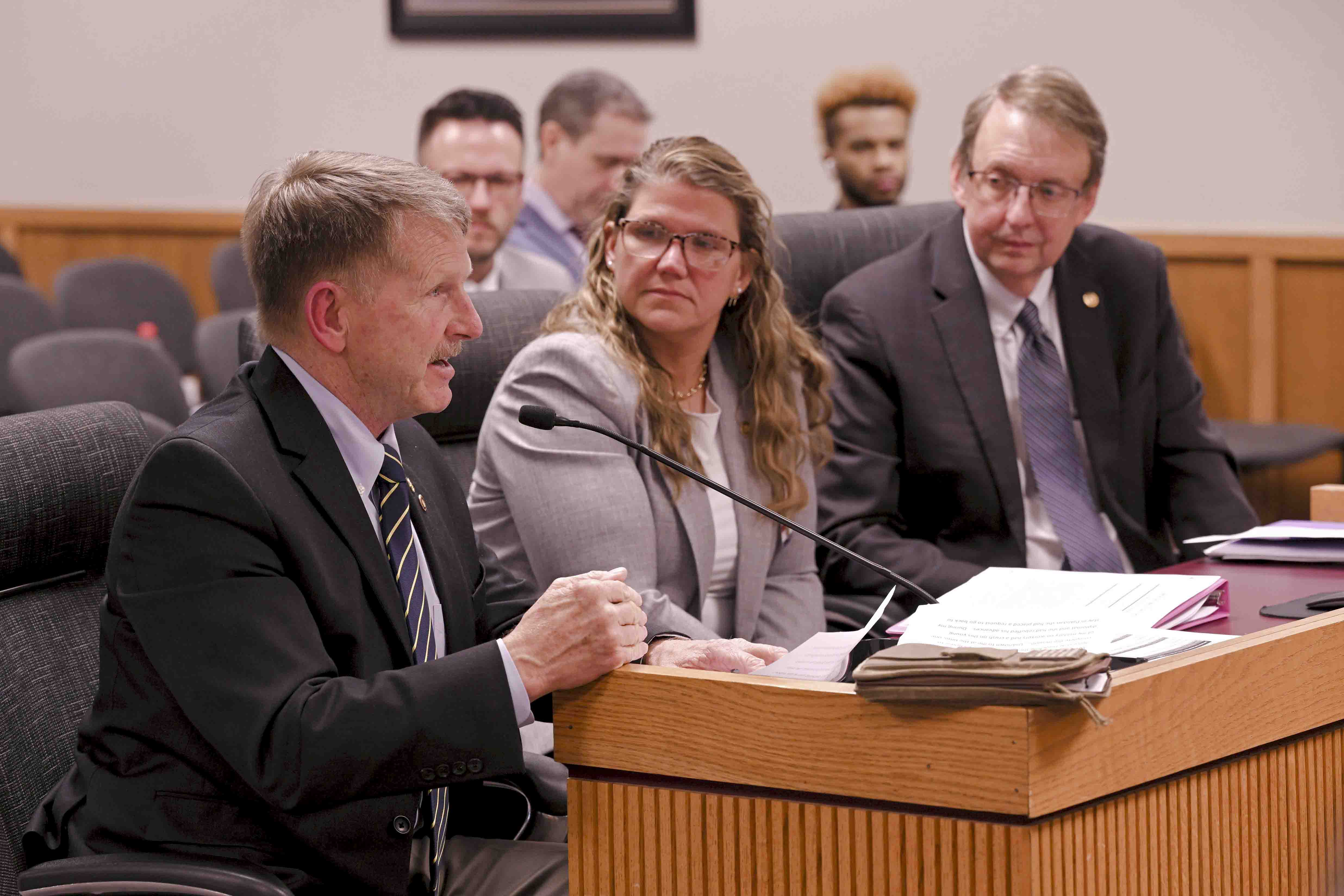
The House voted unanimously to send to the Senate a bill that would criminalize the placing of tracking devices on a vehicle without the knowledge or consent of all recorded owners of that vehicle. Missouri has no prohibition on such tracking, which is often used by domestic abusers to follow the movements of their victims.
The bipartisan legislation was sponsored by three legislators. One of those is Ditmer Republican Cecelie Williams, who filed House Bill 971. She has shared several times this session her own experience as a survivor of domestic violence, in explaining why she is carrying such bills.
Williams said Missouri should be addressing vehicle tracking in law.
Two bills similar to Williams’ were filed, and then combined with hers. One of those, House Bill 978, was sponsored by Lee’s Summit Republican Bill Irwin, a retired Navy Seal and Lees Summit Police officer. When he was presented this legislation he thought, “This is very much common sense. Who could be against it?”
Irwin said he saw firsthand the “evils of tracking,” when deployed to Pakistan as a liaison officer for the Special Operations Command Central to the U.S. Embassy.
A diplomat he worked with there was a woman known for her diplomatic and physical prowess. One of Irwin’s colleagues became interested in her but she turned the man down. What happened next was frightening.
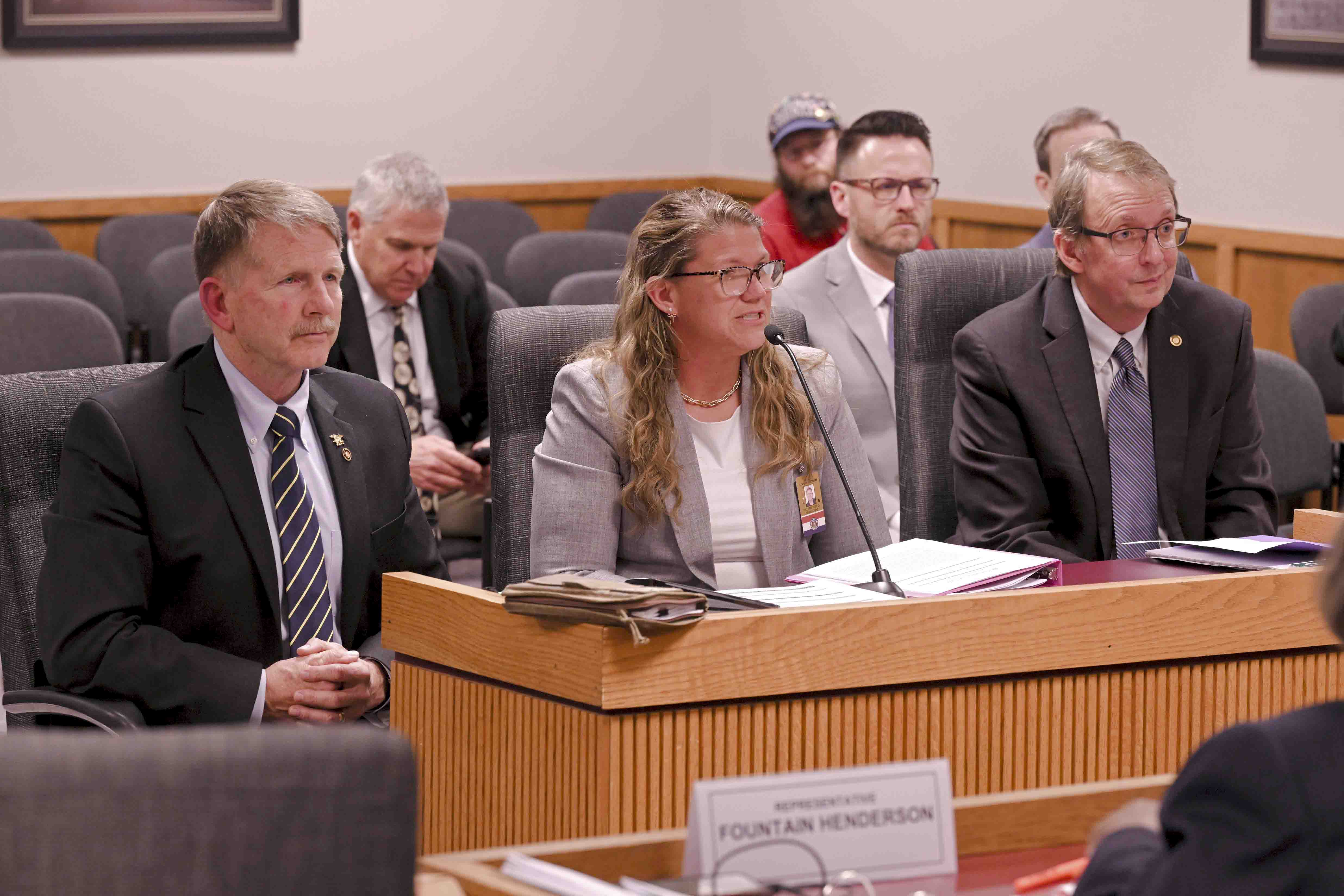
The sponsor of another version, House Bill 293, is Lee’s Summit Democrat Kemp Strickler. He said his first introduction to the issue came from a constituent.
He also referenced a high-profile double murder-suicide that happened in Lenexa, Kansas, in which a woman from Belton, 22 year old Sara Beck, was murdered. Investigators believe she was tracked with a GPS device by her ex-boyfriend.
“The ex-boyfriend also set up a geo-fence that would automatically notify him when she showed up at work, when she showed up at a friend’s house, and when she showed up at home,” Strickler told colleagues.
“This isn’t going to stop it but this will allow us to do something about it when it’s found,” said Strickler.
The House voted 151-0 to send the legislation to the Senate.
